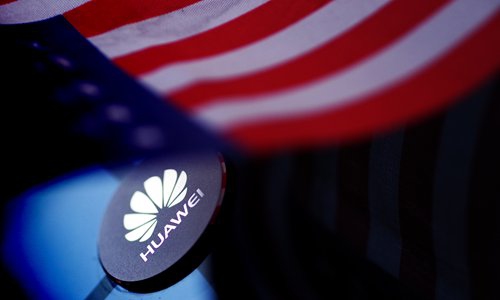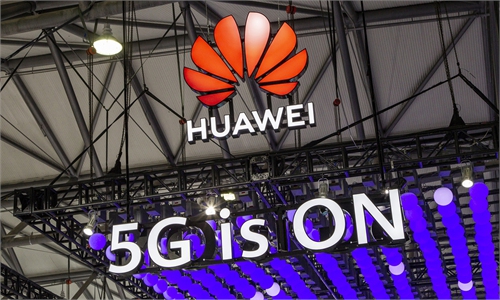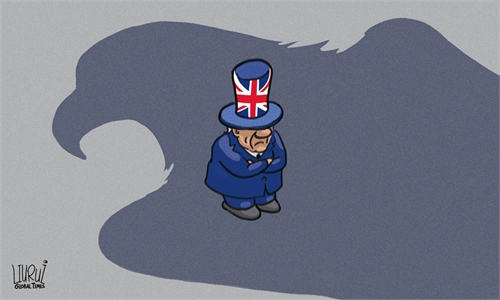
File photo: IC
The Biden administration is considering cutting off Chinese tech giant Huawei Technologies Co. from all of its American suppliers, according to Bloomberg. Huawei was amongst the first Chinese high-tech companies hit by US export restrictions. Today, US suppliers need required government approval to sell to the company. Yet most current applications for new licenses have languished in a stalled approval process.Cracking down on Huawei has become a drill ground and a whetstone for the US' "decoupling" of high-tech with China. From restricting the export of the US' own domestic technology to Huawei, to limiting the export of all global technology products containing US technology to the company, Washington's moves have become increasingly aggressive, mobilizing a larger sanctions regime. The US is now doing the same by restricting Dutch and Japanese companies from exporting chipmaking equipment such as lithography machines to China.
As a result, Huawei's 2021 revenue fell by 28.6 percent year-on-year, and the mobile phone business suffered huge losses. However, the tech giant was not crushed. Its global sales in 2022 stood high at 636.9 billion yuan ($92 billion), almost the same as the previous year. Huawei Cloud, digital power, and smart car business have created new increments. Huawei's self-evaluation of 2022 is that it is a year Huawei would "gradually move away from wartime situations to safety," and put forward the next slogan of seeking "quality" survival.
It is highly possible for Biden's team to continue to tighten the noose on Huawei, but most of their cards to suppress Huawei have already been played. There has been very little room for the US to continue to hurt the company.
It is believed that Huawei is no longer taking any chances with the US government, and it is important for China as a whole to abandon all illusions and prepare for dealing with the more and more radical rhythm of "decoupling" of the US from China in the high-tech sector, and to be prepared for a worse situation in which US allies are forced to participate in a high-tech "decoupling" with China. What we are facing is not an ordinary "decoupling" and blockade, but a US "high-tech war" against China.
The US dominates the major technology in this field, but the ability to manufacture equipment and produce chips is distributed among its multiple allies. The manufacturers of those allies have an interest-based relationship with Chinese companies, and the overall interests of those allies are not very similar to those of the US. However, we should not think that those allies will resolutely resist the US demand for "decoupling" from China for their own economic interests. We must be prepared for them to succumb to Washington one by one.
Just a few days ago, it was reported that the governments of the Netherlands and Japan had surrendered to the US and reached an agreement to jointly ban the export of lithography machines and other key equipment for chip manufacturing to China. China has now formed the mature ability to produce 28nm chips, and with the support of multiple exposure technology, it is also expected to achieve mass production of 14nm chips. Besides, Shanghai Micro Electronics Equipment (Group) Co (SMEE)'s independent research and development of a 28nm lithography machine has made a breakthrough and has the opportunity to fully realize localization. Our manufacturing equipment and chip production capacity are several generations behind the most advanced level, but China already has a solid foundation for independent research and development.
To establish the overall independence of semiconductor products, relevant Chinese companies need high investment in scientific research and large market returns. It should be said that these two conditions are available in China. China has a complete range of industries, sufficient domestic funds, and policy support in place.
As long as we are determined to conquer the commanding heights of semiconductors, with market push and national policy support, the momentum of chip research and development will gradually shift from the US and its allies to China after we endure a few years of difficulties.
China is the largest market for chips in the world, and technological progress is after all driven by demand. China's existing technological capabilities are sufficient to build a solid bridge and channel between technological progress and market demand. As long as China focuses on independent research and development, our stamina will grow day by day, and the old system dominated by the US will become weaker and weaker. The future is on China's side.
After all, the US-led supply chain system is not owned by the US alone, but is composed of multiple forces. It is dominated by politics, goes against market laws, and runs counter to the interests of companies. Therefore, the US till now is unable to rally everyone at its call. It needs a rather long uneasy mobilization process, and there will be many loopholes in it. China can take advantage of these loopholes and use external forces to propel our independent research and development process. And when our efforts gradually take effect, it will dampen the confidence of the US and its allies, making Washington more and more difficult to lead the team in blocking China's high-tech, and eventually disintegrating the bloc.
Eventually, China will reintegrate with the world when it comes to chip industry. At that time, we will have the strategic initiative. The reintegration will be equal to every party and China's national security will not be threatened. As long as we follow this path in a very serious manner, it may only take about 10 years. And US high-tech blockade against China will experience serious fatigue and completely collapse.
The author is a commentator with the Global Times. opinion@globaltimes.com.cn




